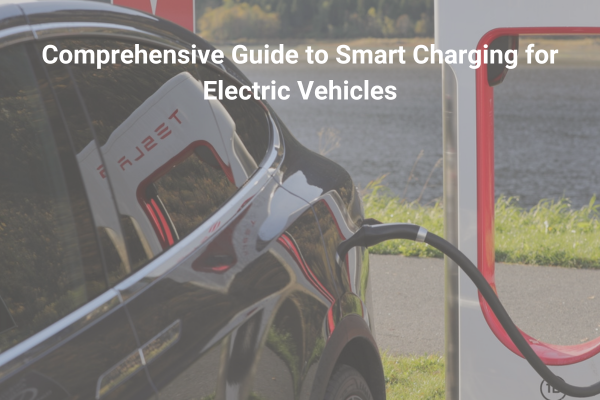Comprehensive Guide to Smart Charging for Electric Vehicles


In this blog, we will delve into the world of BMS and explore how it drives the efficiency, performance, and sustainability of electric vehicles.
As the demand for cleaner and more sustainable transportation continues to rise, manufacturers and researchers are continuously pushing the boundaries of BMS technology to unlock new levels of performance, efficiency, and safety.
Enhanced Energy Management:
One of the primary objectives of BMS technology is to optimize the energy usage and efficiency of electric vehicle batteries. Advanced BMS systems now employ sophisticated algorithms and machine learning techniques to accurately monitor and predict energy consumption patterns. This allows for intelligent energy management, such as optimizing charging and discharging rates, maximizing regenerative braking, and reducing overall energy wastage. These advancements help extend the range of EVs and improve their overall energy efficiency.
Improved Safety Features:
Safety is of paramount importance in electric vehicles, and BMS technology has made significant strides in this area. Modern BMS systems incorporate advanced safety features, including real-time monitoring of cell voltages, temperatures, and currents to detect any abnormalities or potential hazards. Additionally, BMS technology provides overcurrent protection, overvoltage protection, and thermal management capabilities to ensure the safe operation of the battery pack. These safety enhancements not only protect the vehicle and its occupants but also instill confidence in consumers considering electric vehicles.
Intelligent Cell Balancing:
In a multi-cell battery pack, cell balancing is crucial for maintaining uniform voltage levels across all cells. Traditional BMS systems employed passive balancing techniques, but recent advancements have introduced active and intelligent cell balancing. Active balancing redistributes energy between cells to equalize their voltages, resulting in better overall battery performance and extended battery life. Intelligent cell balancing algorithms take into account various factors such as cell aging, capacity variance, and temperature variations to optimize the balancing process.
Predictive Maintenance:
Predictive maintenance is an emerging trend in BMS technology that aims to proactively detect and address potential battery issues before they become critical. By continuously monitoring and analyzing battery health data, BMS systems can identify signs of degradation or abnormalities, allowing for timely maintenance and replacement of faulty cells or modules. This not only improves the overall reliability of electric vehicle batteries but also reduces downtime and maintenance costs.
Integration with Vehicle-to-Grid (V2G) Systems:
The integration of BMS with Vehicle-to-Grid (V2G) systems is another exciting advancement in the field. V2G technology enables bidirectional energy flow, allowing electric vehicles to not only consume energy but also serve as a mobile power source. BMS technology plays a crucial role in managing the energy flow between the vehicle and the grid, ensuring efficient charging and discharging processes. This integration opens up new possibilities for energy management and grid stability, as electric vehicles can act as a decentralized energy storage system.
Intelligent energy management involves the use of advanced algorithms and control strategies to optimize the utilization of energy stored in the vehicle's battery. BMS systems continuously monitor various parameters such as battery state of charge (SoC), temperature, and driving conditions to make intelligent decisions regarding energy usage. By analyzing real-time data, the BMS can dynamically adjust the power flow, charging rates, and other energy-consuming systems in the vehicle to maximize efficiency.
One of the primary objectives of intelligent energy management is to extend the driving range of electric vehicles. BMS systems employ strategies like regenerative braking, which captures and converts kinetic energy into electrical energy during deceleration, and energy recuperation from other vehicle systems. These strategies help recharge the battery and reduce reliance on external charging sources, thereby increasing the overall range of the vehicle.
Intelligent energy management also focuses on optimizing the charging and discharging rates of the battery. BMS systems monitor the battery's condition and performance characteristics to determine the most efficient charging and discharging profiles. This includes adjusting the charging rate to prevent overcharging or undercharging, as well as optimizing the discharging rate to ensure a steady power supply to the vehicle's systems. By carefully managing these rates, the BMS can maximize the battery's lifespan and overall performance.
Furthermore, intelligent energy management considers external factors such as driving conditions, traffic patterns, and weather conditions to make real-time adjustments. For example, the BMS may analyze the route information and traffic data to optimize energy consumption during a trip, considering factors like elevation changes and road conditions. This helps to ensure that the available energy is used efficiently, enhancing the overall driving experience and reducing the need for frequent recharging.
Implementing intelligent energy management requires advanced algorithms, sophisticated sensors, and powerful computing capabilities within the BMS. The integration of artificial intelligence and machine learning techniques enables the BMS to learn and adapt to the driver's behavior and preferences, further enhancing the energy management process.
In conclusion, the advancements in BMS technology have paved the way for intelligent energy management in electric vehicles, enabling enhanced efficiency and optimized energy consumption. The integration of advanced algorithms, real-time data analysis, and machine learning techniques within the BMS has revolutionized the way electric vehicles operate.
If you're looking for a reliable and technologically advanced BMS solution for your electric vehicle, consider partnering with cleanenergyev.com. Our expertise in BMS technology, commitment to sustainability, and dedication to customer satisfaction makes us a trusted choice in the industry. To learn more about our innovative BMS products and how we can enhance the performance of your electric vehicle, visit our website or contact our team today.